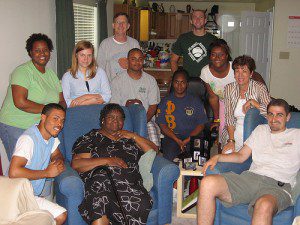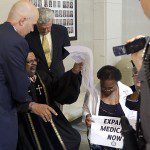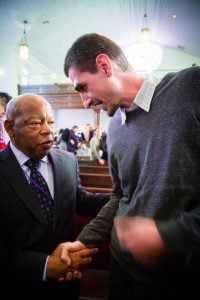
Ten years ago this month, Rutba House hosted a gathering of intentional Christian communities, scholars, and church leaders to talk about what we saw happening in the world around us and how we sensed the Spirit calling us to respond. In truth, we were a young, upstart community trying to find our way in a tradition that had inspired us, though we didn’t know it well. Thankfully, some elders with real wisdom came to share freely what they’d heard and seen. Over four days, we sketched twelve “marks” of a new monasticism that our communities shared in common.
Monasticism, for us, became a language to connect intentional Christian community today with a long tradition of folks who’ve tried to reshape a shared life around the gospel. In the early monastic literature, we found a name that struck a chord: for monastics who hungered and thirsted for righteousness in the ancient desert, intentional community had been a “school for conversion.” Maybe in could be the same in our own time.
All that we’ve done here at SFC has, in one way or another, grown out of that gathering ten years ago. “Come and see,” was our initial invitation. We invited hundreds of people, one small group at a time, to visit the communities that had inspired us. I took 30 young people to Reba Place Fellowship for a weekend; twelve of them signed up to come back for a year! Clearly young people like us were connecting deeply with a 24-7 gospel way of life.
But if we were to be a genuine school for conversion—a space for learning a new way of life—we knew we could not only be about connecting. We had to be intentional about going deeper. It wasn’t enough to feed the spiritually hungry; we had to ask why so many who had grown up in the church were starved for the gospel life.
This question moved us increasingly from community to justice. In every intentional community we worked with, young white people looking for community met children of color on their streets who were victims of generational injustice. “If you’ve come here to help me,” we heard neighbors say, “you’re wasting your time. But if you’ve come here because your liberation is bound up with mine, then let us work together.” Walltown Aspiring Youth became a concrete way for us to work together with the kids in Walltown for our shared freedom.
Education is a justice issue, we were learning. But life in community made it clear that no “issue” stands alone. Folks coming home from prison taught us that our kids were struggling to stay out of a “school to prison pipeline,” a seemingly inevitable path that so many of them had slipped into when they were in middle school. Most of us had never seriously considered America’s criminal justice system. We didn’t know it had anything to do with us. Project TURN became a way for some who’d never thought about prison and others who’d known its threat their whole lives to learn from one another.
Always, we’ve kept the circle small: six, twelve, twenty people seated in the round, sharing their own stories. From the beginning, we wanted to learn from those who’d gone before us. On community, the monastics were our guides. On justice, we began to look to the Southern Freedom Movement. 21st-Century Freedom Ridesbecame a way for us to invite others to “come and see.”
What have these ten years helped us to see? All the national surveys about religion say denominations are shrinking and religious “nones” are on the rise. But having worked with people who are hungry for a deeper faith that builds community and justice, this data doesn’t look like a decline in faith as much as a paradigm shift. I have a piece in the Washington Post this week about how some who we’ve worked with through SFC are leading what looks to me like the beginnings of a fourth Great Awakening.
But if the Spirit is indeed stirring a Movement to change the shape of faith not just for small groups of people but for society as a whole, where will folks go to imagine the new organizations and institutions that can sustain this faith as a way of life? More and more, it seems to me that this is the question SFC is called to ask. Our work will continue to be small. It’s not our job to build structures. But we have learned that we can carve out space for the people who do this important work to have the conversations that matter.
Indeed, such spaces are what makes trasformative education possible. I pray that over the next decade we can become a school for the world to come.











